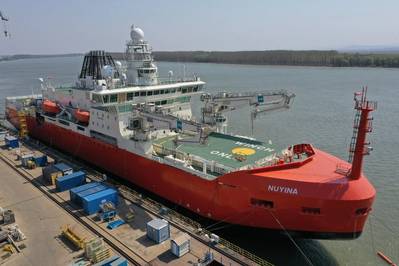Sea Trials for Australia's New Icebreaker Delayed Due to COVID-19
Australia's newly built Antarctic icebreaking research and supply vessel (RSV) is nearly ready to be delivered, but its sea trials have been delayed due to the coronavirus pandemic, the Australian Antarctic Division (AAD) said.
Construction of the ship commenced at Damen’s Galați shipyard in Romania in May 2017, and the vessel was floated out in September 2018 prior to its scheduled arrival at its home port Hobart in 2020. But delays brought on by the COVID-19 outbreak have derailed the delivery schedule.
“The fit-out and testing schedule for the vessel is being severely impacted by travel restrictions around the world, with specialist teams unable to get to the shipyard in Romania,” said AAD General Manager of Operations and Safety, Charlton Clark.
“Due to the uncertainty around the coronavirus situation, we don’t know when the ship will be finished and ready to undergo the required sea-trials before being handed over to the Australian Antarctic Division,” Clark said.
The 160-meter-long, 24,000-metric-ton RSV Nuyina, designed by Knud E Hansen, was built to replace the retired Aurora Australis, offering scientists extended access to the Southern Ocean and Antarctica.
RSV Nuyina was slated to make its first voyage to Antarctica for the 2020-2021 summer season, operated by Serco Defence under the direction of the AAD for the Australian Government, but its delayed arrival means an alternative ship will be used next summer season.
Last month the AAD reached a deal with Dutch company Maritime Construction Services to use the ice-class multipurpose vessel Everest from December 2020 until March 2021.
Scaling back
Elsewhere, the coronavirus pandemic is having a significant impact on all aspects of the Australian Antarctic Program, forcing limited movement of people and decreased operational capacity, reduced ability to recruit and train new teams and supply chain disruptions that have resulted in increased costs.
AAD Director, Kim Ellis, said the coronavirus' impacts will result in the 2020-21 summer season being scaled back.
“We will focus solely on resupplying our stations and changing over teams. As a result, there will be no major construction activities and science projects will be limited to automated data collection,” Ellis said.
“Projects requiring the deployment of dedicated expeditioners or logistics outside of essential activities will be reevaluated in the future.”
“Our planning for the 2020-21 summer season continues to center on the need to prevent the spread of COVID-19 through the Australian Antarctic Program as it is deployed south.”
“The safety of our expeditioners living and working at our three Antarctic stations and on Macquarie Island is our priority,” he said.














